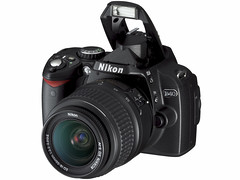Digital SLR Photography Made Easy

Taking pictures has been a hobby of mine ever since I can remember. As a kid, my parents started me off with an el-cheapo camera to run around with and snap pictures of my friends, pets and everything else. Then as I became older I was trusted with the family’s Pentax, and used it for my photography classes in high school. I loved playing with photography so much that I used to go to school early to hang out in the darkroom. Then in college, I bought myself a Canon EOS Rebel, the cream of the crop back then. That thing was my favorite all the way up until I bought my first digital camera five years ago.
Most professional photographers these days prefer an SLR (single-lens reflex) camera. I always wanted to buy a digital SLR, but just never came around to it, mostly because of the big price tag. I was surprised on Christmas morning when I opened a box my husband gave me, which contained Nikon’s new D40 Digital SLR camera. I had my eye on it since it was announced in November, but never would have expected it for Christmas.
While digital SLR cameras are the most popular among professional photographers, some people shy away from these because of complications to the average user. Nikon has addressed these concerns with the D40. Its ultra-compact, lightweight design and simplified features makes it an affordable alternative to a professional camera. It is a point-and-shoot SLR is designed to offer consumers the ability to see higher quality pictures with one push of a button. The images come out up to 6.1 megapixels, and its visually intuitive menu brings this digital SLR down to earth and simple.
What impressed me is that you can keep on snapping pictures without the camera pausing for any delays. One of the things that annoys me the most about my regular digital camera is that pause. Sometimes when that happens, I miss out on good shots. With the D40’s settings at the full 6.1 megapixels, you can keep clicking that button, and it will shoot your pictures at 2.5 pictures per second, non-stop for up to 100 shots. Additionally, the camera reacts instantly to you pushing down that shutter button. Thereafter, the images are rapidly recorded to the SD memory card.
The back of the D40 has a bright and large 2.5-inch color LCD. Sticking with the traditional SLR concept, you unfortunately can’t use the screen as a viewfinder to snap the pictures, but viewing your pictures on the large screen afterwards is rewarding. With it, the camera features built-in help you can easily access at the touch of a button, and view Assist Images that help you select appropriate settings for camera features by viewing sample images typical of that particular setting. You can also do extremely close zoom-ins to the images you took. When I first played with my D40, I took multiple pictures of my parrot, zoomed in on the details of his feathers, and the detailed clarity is just amazing!
Depending on what you’re shooting, the D40’s scene-optimized Digital Vari Program modes allow you to capture just about any type of scene without having to fuss with the camera settings. It includes eight preset modes, including a Flash Off mode that shuts off your camera’s flash and boots the ISO so you can easily take pictures where flash photography is prohibited. I find this useful since I try to use natural lighting with my photos anyway.
Another excellent feature is the Retouch menu. This lets you do in-camera image editing, adding to the camera’s entertainment value and providing you with greater creativity without the need of your computer. The Retouch menu includes D-Lighting (brightens dark pictures), In-Camera Trimming (cropping or creating smaller files for easy e-mailing), In-Camera Red-Eye Fix, Image Overlay (merge files), Monochrome Settings (Black and White, Sephia or Cyanotype) and Filter Effects (Skylight, Warm Filter or Color Balance).
The Nikon D40 Digital SLR camera comes packaged with the new 3x zoom Nikkor lens and is also compatible with all of Nikon’s AF-S and AF-I Nikkor lenses. It is available for $600 at Ritz Camera (www.ritzcamera.com), Circuit City (www.circuitcity.com) or Best Buy (www.bestbuy.com). Note that an SD memory card is NOT included, so make sure you buy one of those as well.


0 Comments:
Post a Comment
<< Home